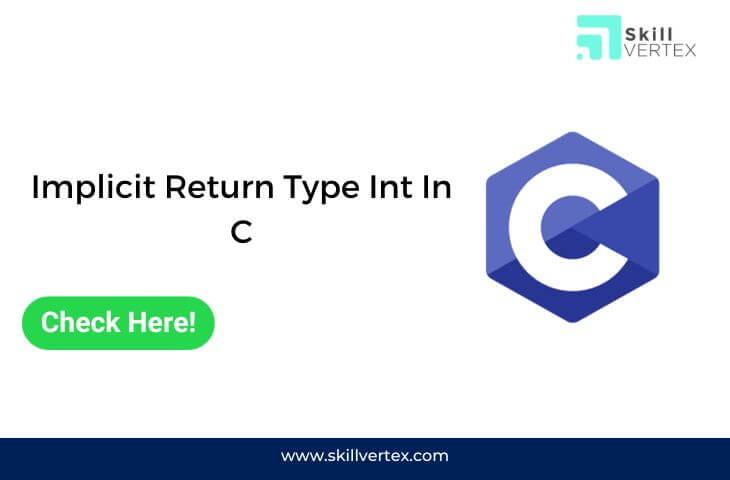Table of Contents
Implicit Return Type Int In C
In the C programming language, a unique feature that sets it apart from many other programming languages is the concept of an implicit return type of int. Unlike languages where a function’s return type must be explicitly defined, C allows for a default return type of int when none is specified. This means that if you don’t explicitly declare the return type of a function, the C compiler assumes it to be an integer (int). This implicit return type is a fundamental aspect of C’s syntax and can lead to concise code when used judiciously. In this discussion, we will explore the implications and applications of the implicit return type int in C programming.
To Find the Output Of the Program
Find Out the Output of the following C program
#include <stdio.h>
fun(int x)
{
return x*x;
}
int main(void)
{
printf("%d", fun(10));
return 0;
}Output
100Omitting the return type of a function is allowed in some older C standards like C89, and the compiler assumes an implicit return type of int in such cases. This behavior is not allowed in the C99 standard, and specifying a return type is required.
In C++, the omission of a return type is not allowed in modern C++ standards. All C++ functions must specify their return type. While some older C++ compilers, like Turbo C++, might have allowed it, adhering to modern C++ standards (e.g., C++11 and beyond) requires specifying the return type for all functions.
FAQ- Implicit Return Type Int In C
Q1.What is the implicit return type in C?
Ans. In C, when a return type is not provided for a function, the compiler defaults to assuming an implicit return type of int. However, it’s important to note that while the C89 standard permitted the omission of the return type for functions returning int , the C99 standard no longer allows this omission. As a result, you must specify a return type for all functions, even when it is int.
Q2. What is the implicit return type?
Ans. In object-oriented languages like C++ and Java, class constructors implicitly return the current instance (object) of the class they are constructing. Thus, the implicit return type of a class constructor is the class type itself.
Q3. What is implicit vs explicit in C?
Ans. Implicit type conversion, often referred to as “type coercion,” occurs automatically by the compiler when there are multiple data types in an expression. It’s done without the need for the user to specify it explicitly. The compiler tries to make sense of the mixed types and performs conversions as needed to produce a consistent result.
On the other hand, explicit type casting in C (also known as “type casting” or “type conversion”) must be explicitly defined by the user. It involves temporarily changing the data type of a variable to another data type using casting operators. This is typically done when the user wants to enforce a specific type conversion that the compiler wouldn’t perform implicitly.
In both cases, the return type (int) is explicitly stated. This is considered good practice for code readability and maintainability, and it adheres to modern C and C++ standards.
Hello, I’m Hridhya Manoj. I’m passionate about technology and its ever-evolving landscape. With a deep love for writing and a curious mind, I enjoy translating complex concepts into understandable, engaging content. Let’s explore the world of tech together

